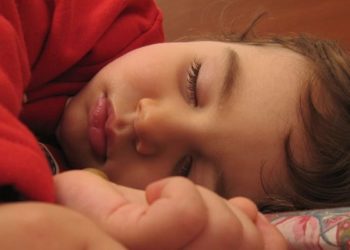Napping associated with poor sleep behavior and quality in children above 2 years
1. A systematic review of studies found that napping was associated with shorter duration, later onset, and poorer quality of night sleep in children above 2 years of age.
2. Studies on the effect of napping on behavior, cognitive functioning, and physical health were inconsistent in their findings.
Evidence Rating Level: 2 (Good)
Study Rundown: Quality sleep has been found to have positive health effects in early childhood, but these findings have been based mostly on studies of nighttime sleep or total sleep in a 24-hour period. This study aimed to determine the independent effects of napping on child health. Napping was defined as any period of sleep recorded during daytime hours. A systematic review of studies on napping in 0 to 5 year old children found that there had been 26 studies on the subject. All were observational studies with various limitations in study design (e.g. parent reporting of napping duration instead of direct observation). The only consistent finding among these studies, all on children older than 2 years, was a negative association between napping and nighttime sleep, including shorter duration, later onset, and poorer quality of sleep. One study examining the onset of this effect found that napping had a negative effect in only children above 2 years of age, a previously identified period of decrease in daytime sleep. Studies on the effect of napping on behavior, cognitive functioning, and physical health were all inconsistent in their findings.
This study thoroughly examined the literature and evaluated all identifiable studies on napping in children up to 5 years of age. There was an abundance of poor individual study design with a lack of any randomized controlled trials (RCTs). Further, a meta-analysis could not be conducted given the heterogeneity of study designs. Overall, these findings contribute to the literature by suggesting that there is limited evidence to promote napping for health benefits beyond the age of 2, and that more high quality studies are needed on the subject to determine the independent effects of napping on child health and development.
Click to read the study in Archives of Disease in Childhood
Relevant Reading: Sleep, cognition, and behavioral problems in school-age children: a century of research meta-analyzed
In-Depth [systematic review]: This study was a systematic review of research evaluating napping and its effects on night sleep, behavior, cognition, and physical health in children 0-5 years old. Studies were evaluated for quality on a GRADE (Grading of Recommendations, Assessment, Development and Evaluations) scale. There were 26 observational studies, mainly from Japan, the United States, and Canada, of varied study designs (experimental, quasi-experimental, longitudinal, and cross-sectional) included in the review. Overall, authors found the studies on napping to be of low quality, in addition to not having any RCTs on the subject. The nine studies on nighttime sleep were consistent in their findings of a negative association between napping and nighttime sleep. Napping was associated with later sleep onset, reduced duration, and poorer quality sleep. While most of these studies included only participants older than 2 years, one study that included patient younger and older than two years found that this association was true only in children older than 2 years. The results of the 5 studies on behavioral outcomes, specifically on anxiety and depression, were inconsistent. Studies on cognitive development also had inconsistent findings. While three studies found a positive effect of napping on language development, one study found a negative effect. Studies on the effect of napping on physical health were limited. The two studies on napping and physical accidents in preschoolers were both found to have flawed study designs. Finally, while three studies found an association between shorter sleep duration and obesity, none found an independent effect of napping on obesity.
Image: PD
©2015 2 Minute Medicine, Inc. All rights reserved. No works may be reproduced without expressed written consent from 2 Minute Medicine, Inc. Inquire about licensing here. No article should be construed as medical advice and is not intended as such by the authors or by 2 Minute Medicine, Inc.






